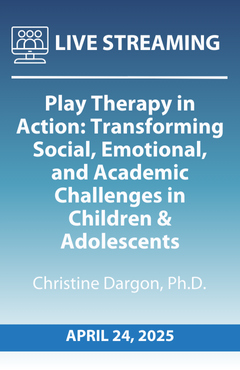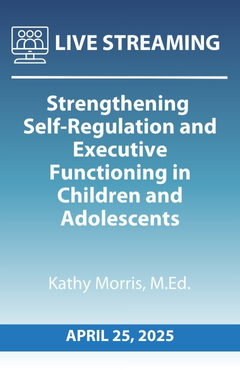Description
By purchasing this product you are registering to attend the conference/this workshop VIRTUALLY if you would like to attend in person please register at http://www.jackhirose.com/workshop/play-therapy/
This workshop will be live streaming to online participants on April 24, 2025 from 8:30am – 4:00pm (Vancouver, BC)
Please adjust your start time according to your specific time zone.
Recorded footage and all course content (certificate, videos, quiz) will be available until May 26, 2024. Extensions cannot be granted under any circumstances.
Please allow 3 – 10 business days after the course airs for recorded footage to become available.
Registration will close on April 23, 2025.
Children often struggle to fully understand and communicate their experiences because their cognitive and emotional development is still in progress. They may lack the vocabulary to express their feelings or the cognitive tools to make sense of their world. This is where Play Therapy becomes an invaluable resource. Play Therapy provides children with a natural, engaging way to communicate, process their emotions, and explore their inner experiences.
This workshop will teach participants how to harness Play Therapy as a powerful tool for both communication and assessment. You will learn how to interpret children’s play—what they choose to play with, what they create, and how they engage with you as a professional. Through their play, children reveal critical insights into their struggles, allowing us to understand the underlying causes of their behaviors and emotions.
By attending this seminar, you will gain a deeper understanding of how to decode children’s play and use it to assess their emotional and psychological needs. You’ll also leave with a practical toolbox of Play Therapy techniques that can be immediately applied in your work with children and clients of all ages. This toolbox will include interventions for addressing a variety of presenting issues, such as anger, ADHD, depression, and anxiety. Techniques will include Sand Tray therapy, coloring, the use of puppets, dance/movement, “I Spy,” and many other creative methods.
Much of the seminar will involve active, hands-on learning, where you’ll have the opportunity to practice and experience these techniques firsthand. Prepare for an engaging, dynamic experience that will help you see the world through a child’s eyes, while equipping you with the tools to make a meaningful difference in their lives.
- Introduction to Play Therapy – How to Use It
- Overview: Understanding Play Therapy’s role in emotional expression and child development.
- Techniques and Approaches:
- Non-Directive vs. Directive: Child-led vs. therapist-guided play.
- Soft vs. Hard Mediums: Impact of materials (e.g., toys vs. writing tools) on therapy.
- Assessment and Benefits: Using play for diagnostic insights and emotional healing.
- Hands-On Learning: Play Therapy Techniques
- Non-Directive Techniques:
- Sand Tray, Watercolors, Play Dough, Drawings, House-Tree-Person, Finger Painting.
- Directive Techniques:
- I Spy, Movement & Music, Drama, Puppets, Maps, What Do You Want to Be?, Animal Play, Doll House, Dance, Board Games, Emotions – Feeling Faces.
- Interactive Practice: Participants will engage with these techniques through group activities.
III. Play Therapy for Specific Disorders
- Techniques for:
- Anger & OCD
- Anxiety
- ADHD
- Depression & Self-Esteem
- Trauma & PTSD
- Abuse
- Fears
- Play Therapy with Families, Groups, and Couples
- How to apply Play Therapy in family, group, and couples settings for enhanced communication and healing.
- Areas of Caution
- Mediums: Choosing appropriate materials.
- Sexualized/Acting Out Behaviors: Addressing inappropriate behaviors.
- Abuse-Related Play: Understanding repetitive themes in abused children.
- Conclusion
- Q&A and Reflection: Discuss experiences, insights, and integration into practice.
Education and Clinical Professionals: All education and mental health or healthcare professionals who work with children or youth including, but not limited to K–12 Classroom Teachers, School Counsellors, Learning Assistance/Resource Teachers, School Administrators, School Paraprofessionals including Special Education Assistants, Classroom Assistants and Childcare Workers • All other professionals who support behavioural challenges and complex learning needs including but not limited to: Nurses, Social Workers, Psychologists, Clinical Counsellors, Family Therapists, Occupational Therapists, Speech Language Pathologists, Addiction Counsellors, Youth Workers, Mental Health Workers, Probation Officers and Community Police Officers.
Christine Dargon, Ph.D., Christine is a retired psychologist. She continues her work teaching as college faculty for almost 30 years at two universities. She consults and now owns a health and wellness center, with two locations in Northern AZ, focusing on integrative techniques to help individuals of all ages such a yoga, meditation, mindfulness, breath work and much more. She continues to also train professionals in play therapy and sand tray interventions.
| Registration | Early bird Fee | Regular Fee |
|---|
| Individual Enrollment | $244.00 | N/A |
| Group 3 - 7 | $194.00 | N/A |
| Group 8 - 15 | $169.00 | N/A |
| Group 15+ | $144.00 | N/A |
| Full-Time Student | $144.00 | N/A |
All fees are in Canadian dollars ($CAD) and per person.
Group rates and student discounts are available. Please contact webinars@jackhirose.com for more information.
Fees are per person, seat sharing is not allowed. Please respect this policy, failure to comply will result in termination of access without a refund. For group rates please contact webinars@jackhirose.com





